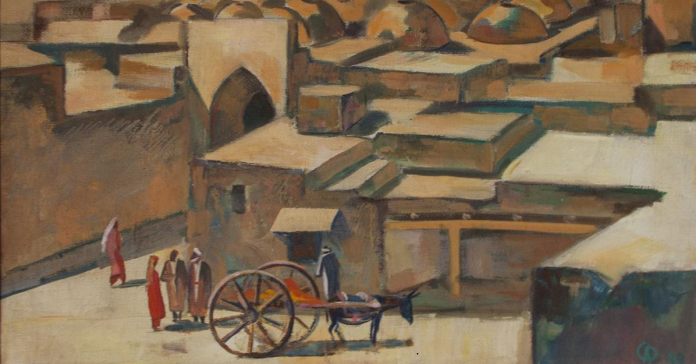The Russian Empire squeezed Indian traders in Central Asia when it wanted to extract diplomatic concessions in British India.
A contemporary Indian traveller to the fabled Silk Route city of Bukhara is more than likely to be reminded by locals about the time when traders from the Indian subcontinent called the city home. For centuries, they came from places such as Multan, Shikarpur and Peshawar.
From the Emirate of Bukhara, they could enjoy easy access to Urgench, Khiva, Samarkand, Tashkent, Ferghana, among other places. It was a freedom that suited commerce and continued well after 1868, when the Russian Empire completed its conquest of Bukhara and the emirate became a protectorate of the tsar.
However, by the early 20th century, the sands of time shifted. As the Russian government began to impose restrictions on the freedom of movement of its subjects and foreigners alike, the Indian community in Bukhara too became a casualty.
In 1910, the British Embassy in St Petersburg started receiving telegrams from Indians in Bukhara about strictly-enforced rules on their movement and renewal of residence permits within what was then called Russian Turkestan. Since Britain did not have consulates in the parts of Central Asia that fell under the Russian Empire, the embassy in St Petersburg had to tackle requests from British Indian subjects in the region.
In a letter to British Foreign Secretary Edward Grey, dated March 8, 1911, British Ambassador to Russia George Buchanan spoke about the need to assist the Indians in Bukhara. “The latest case is that of a person named Abdul Rashid Hadji Muhammadinoff, who asked for permission to remain at Kerki to wind up his affairs there,” Buchanan wrote. “A number of telegrams with numerous signatures of members of the British Indian community in Bokhara have been addressed to this embassy on his behalf. The senders of these telegrams represent that the individual in question owes them large sums of money, and that, unless he is allowed to remain at Kerki and collect his outstanding debts, he will not be able to pay them, and they will suffer enormous losses.”
The Russian Foreign Ministry refused to budge, despite a request from Buchanan, who followed up with a verbal note, in which he pointed out that the British Indian community in Russian Central Asia attached “great importance” to this case.
Appeals for help
Other Peshwari traders sent similar appeals to the British authorities. A few months before Abdul Rashid approached the British Embassy in St Petersburg, one Haji Karim Baksh co-wrote a petition to William Rudolph Merk, Agent to the Governor General of the Northwest Frontier Province, in which he requested British intervention. Baksh claimed in the letter that 13 Indian merchants were being “hampered by the Russian authorities in realising their debts in Russian Turkistan and Bokhara” and were being “hindered from travelling freely about the country” as they had been accustomed to.
“We most respectfully beg to say that we trade in Turkistan, Central Asia and Russia since the past 60 years,” the petitioners wrote. “We have got our regular business shops at Bokhara and Samarkand. The traders with Bokhara have business with our shop there while all the residents of Turkistan in Russia and those of Jezakh, Urateba, Khojand, Tashkend, Kokand, Marghilan, Andijan, Namangand, Osh, Khiva, Urginch, Petro-Alexandersk etc have dealings with our shop in Samarkand, and these buy green and black tea of China, India and Ceylon, and Indian indigo from us.” The goods were purchased from Bombay, Colombo and Shanghai and shipped to the Black Sea port of Batumi before being taken overland to Samarkand and Bukhara.
The petitioners explained that they sold products on credit, sometimes giving buyers two years to pay. Because of the disruption in business caused by the Russians, outstanding payments were stacking up. People owed them as much as “hundreds of thousands of rupees”, said the petitioners, all of whom were Peshawaris but maintained that they represented people from Punjab as well.
“Before the advent of the Russians in Turkistan, when it was under Bokhara, we the Indians traded freely, and we marched in those territories without hindrance and settled wherever we liked,” the merchants wrote. “Our demands were fully considered, and we lived comfortably under the British Raj: we had a firm belief that under Russians our claims would be more favourably considered, but on the contrary, we and our agents at Turkistan in Russia and Bokhara are put to unnecessary trouble and we are being deprived of our freedom.”
Under the Russians, the merchants said, travel and passport procedures had been made incredibly bureaucratic, hindering their ability to travel and conduct business. They concluded by calling on the British authorities to intervene.
The Great Game
Documents in the British Indian archives suggest there were 600 Indians living in Bukhara at the time. Given the geopolitical fault lines, there was a genuine fear among the London elite that some of these people could be recruited by Russian intelligence to work against British interests in Afghanistan and Northwest India. Helping the Indian merchants became a priority.
The British began to suspect that the restrictions imposed on Indians in Bukhara were a Russian tactic to get greater access to India. By 1911, the Great Game, the 19th-century Anglo-Russian geopolitical rivalry in Asia, had ended; the borders and buffers between the two enormous empires were set, but mutual distrust remained high.
Russia had a consulate in Calcutta at the time and was looking at establishing diplomatic missions in Rangoon, then a part of British India, and reopening a consulate in Bombay. The idea behind having a vice consulate in the Burmese city was to keep an eye on British movements towards Siam. For Russia, Siam (now Thailand) was important. Tsar Nicholas II shared a personal friendship with King Rama V and Russia played an instrumental role in keeping Thailand free of colonialism.
In Bombay, the Russians wanted to help facilitate the movement of Muslim pilgrims from the empire to Mecca. The first Russian consulate in India actually opened in Bombay in 1900, but the St Petersburg authorities moved it to Calcutta 10 years later, a decision that the Russians almost immediately regretted after the British shifted the Indian capital to Delhi.
Letters and telegrams exchanged between British officials suggest that they suspected the Russians of hampering the activities of Indian traders to extract diplomatic privileges from Britain in India.
Several officials suggested that the best way for the British to help Indian traders in Russian Turkistan was to open a consulate in the region. Potential candidates were Tashkent, Samarkand and Bukhara. Lord Curzon, best known in India for being the viceroy who partitioned Bengal, was in favour of a consulate in Samarkand.
“I have recommended Samarkand as the place in Central Asia best suited for a British consulate,” Curzon said in a letter to the authorities in London. “I have visited Tashkend, Samarkand and Bokhara; and I regard the second of these as the most suitable for these reasons. (1) It is within short distance of Bokhara, where there are large Indian trading interests and an Indian community. (2) It is nearer to the Afghan frontier than Tashkend, and any movement of forces towards that frontier from Turkistan must pass through and be known at Samarkand. (3) It is the most central spot of observation both for Trans-Caspia and Turkistan.”
The Russians turned down several requests for a British consulate in Samarkand, precisely because they felt it would be a spying post. They, however, agreed to consider Buchanan’s suggestion to constitute a board that would include members who represented Russia, Indian traders and the British Indian government. On this board, the British also wanted to include a representative of the Shikarpuri community.
Since the British anticipated a Russian response to the proposal for the board, a request was made to open a consulate in Tashkent. The Russians were told they could have a vice-counsel in Bombay in exchange. If such a British mission were ever opened in Tashkent, it would have likely changed hands to India in 1947 like the consulates in Lhasa and Kashgar. However, this was not to be.
A few issues faced by the Indian traders in Bukhara were addressed over the next few years as the geopolitical dynamics drastically changed in the region. In 1914, the First World War broke out, followed by the 1917 Russian Revolution and the Russian Civil War. The Emir of Bukhara, who was a friend of Tsar Nicholas II, took the side of the White Army in the Russian Civil War. By 1920, the city fell to the Red Army, making it a part of the Bukharan People’s Soviet Republic. It would later become a part of the Turkmen Soviet Republic and then the Uzbek Soviet Republic. The Indian community in Bukhara fled the city after it fell to the Reds in 1920, ending a centuries-old legacy that linked India with the Silk Route.
Ajay Kamalakaran is a writer, primarily based in Mumbai. His Twitter handle is @ajaykamalakaran.














